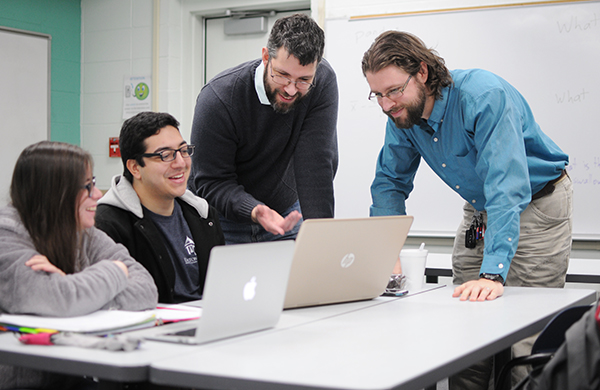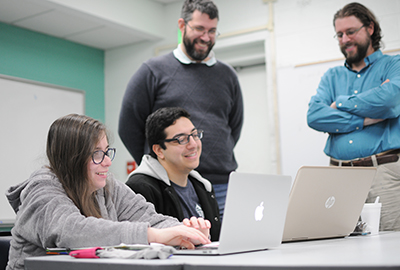News
Dalton State Partners with Industry to Solve Real-World Math Problems
04/04/18
 Math was the subject in school with an absolute answer, but what math majors come to realize is that real-life math isn’t always that straight forward.
Math was the subject in school with an absolute answer, but what math majors come to realize is that real-life math isn’t always that straight forward.
In actuality, math can be messy and complex and many times there’s not one single solution to a problem. Fernando Cedano and Karina Rangel, who are participating in a specialized course at Dalton State that gives math majors real-world experience, are learning that first-hand.
Students in the course work with area industries to solve actual problems. The class also allows industries to have problems reviewed and solved by mathematicians. This is the second semester Dalton State’s math department has partnered with industry to provide the course.
“People don’t realize that higher math is actually collaborative,” said Dr. Nicholas Gewecke, an assistant professor of mathematics. “One person doesn’t necessarily have all the knowledge needed to solve a complex problem. So we’re working together. A lot of times with math we think students learn the material just to reproduce it on a test, but there’s more to it than that. You have to have that knowledge base so that’s why we do individual testing, but we actually work together in higher math.”
Opportunities like this are important for math majors to reveal there are more careers out there than teaching math. But often, the jobs aren’t labeled “mathematician,” Gewecke said.
“Through this class, our students get experience, and this introduces them to what careers are out there,” he said. “A student in last year’s class got a job offer because of this course.”
 The class began through the Preparation for Industrial Careers in Mathematical Sciences program, which was funded through the Mathematical Association of America. The PIC Math grant was not renewed this year, but Dr. Randall Griffus, dean of the School of Science, Technology, and Mathematics saw the benefits of continuing the course. Griffus is hopeful the MAA will offer the grant for PIC Math again next year.
The class began through the Preparation for Industrial Careers in Mathematical Sciences program, which was funded through the Mathematical Association of America. The PIC Math grant was not renewed this year, but Dr. Randall Griffus, dean of the School of Science, Technology, and Mathematics saw the benefits of continuing the course. Griffus is hopeful the MAA will offer the grant for PIC Math again next year.
“I honestly didn’t know what you could do with a math major besides teaching,” said Rangel, who is a math major expected to graduate in fall 2019. “My eye is being opened to something different in this course. I’ve enjoyed math all my life but didn’t know what I could do with it. This class is giving me a better understanding of what I can do when I graduate.”
In order to protect corporate security, there’s no way to know what the project from a local industry will be until the class has formed and nondisclosure agreements are signed. So two faculty members came on board to guide the students through this process, Gewecke and Dr. John Asplund, an assistant professor of mathematics.
“Students are using skills they learn in classes to solve these problems,” Asplund said. “There are several benefits from this, and our students benefit in many ways. This class could be anything, which is a challenge for everyone involved. We didn’t know if this problem would require a knowledge of modeling, which is more Nick’s area or data, which is mine. We’ve been training to meet the needs of the company.”
Currently, the students are learning more about math-based computer programming.
“This class is motivating me to learn new things,” said Cedano, who is expected to graduate in Fall 2018. “Learning programming has been the biggest challenge for me. I signed up for the class because some of my friends took it last year and told me how cool it was. It fit my schedule so I decided to give it a try.”
Cedano knew he didn’t want to teach but he wasn’t sure which career path he would take when he graduated. Now, he’s learning toward programming or data analysis. He sees many opportunities in this area for a mathematician.
“Math is messy,” Gewecke said. “The real world has lots of variables, and we’re here to figure out what’s important. It’s not your problem sets from class where there’s one answer. Sometimes we ask for more data or different information, and we don’t get it. We may think something is important but the company doesn’t. Or the company may think something is important that we don’t. We have tools to get us close to a solution. Sometimes we present a solution but it may not be feasible for the company.
“In this class, the professors don’t have the solution,” he said. “We cannot tell the students what to do. We can guide them and help them with concepts, but we can’t say, ‘Here’s how you solve this equation.’”
That’s exactly what appeals to students.
“It’s frustrating sometimes. You know the answer isn’t going to be handed to you,” Rangel said. “But I like the challenge.”
There are more opportunities for industry to become involved in the partnership. For more information, contact Griffus at rgriffus@daltonstate.edu or 706-272-2509.
